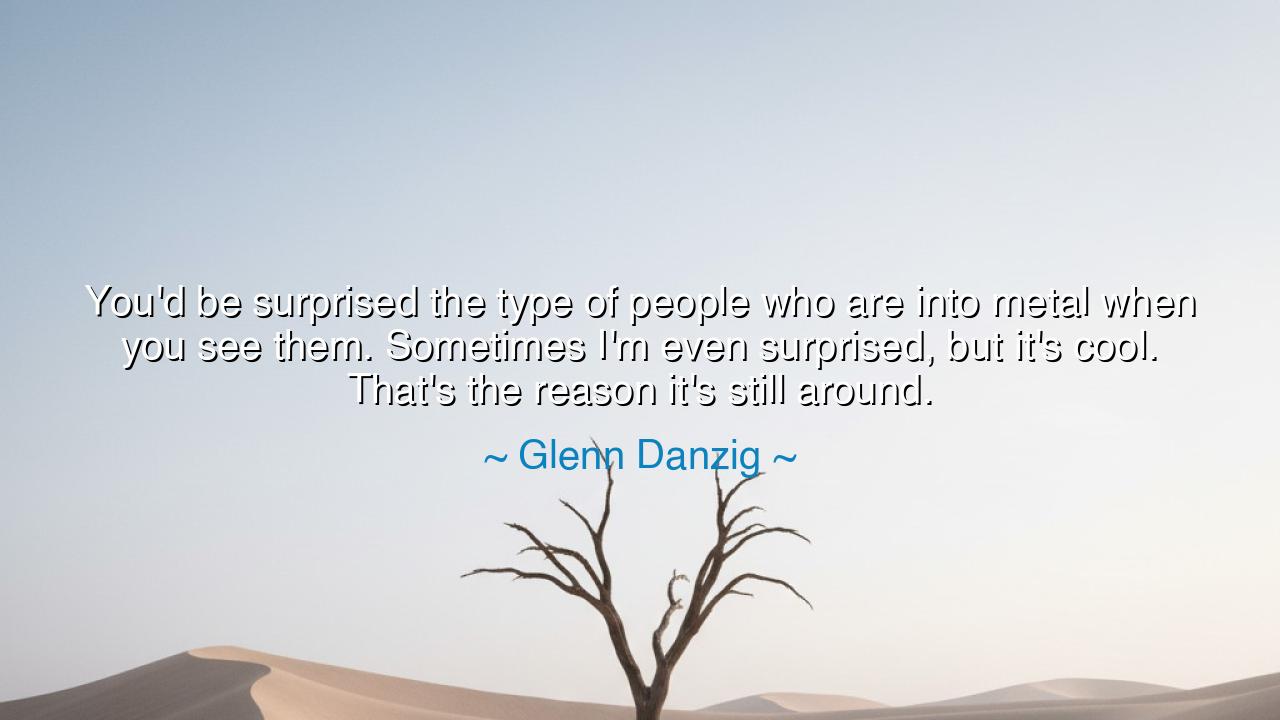
You'd be surprised the type of people who are into metal when you
You'd be surprised the type of people who are into metal when you see them. Sometimes I'm even surprised, but it's cool. That's the reason it's still around.






“You'd be surprised the type of people who are into metal when you see them. Sometimes I'm even surprised, but it's cool. That's the reason it's still around.”
— Glenn Danzig
In these words, Glenn Danzig, the dark poet of heavy metal, speaks a truth that reaches beyond music—into the very nature of the human spirit and its longing for freedom. His voice, carved from the rawness of rebellion and art, reminds us that metal is not just sound—it is a mirror, reflecting the hidden power within the hearts of those who listen. To say that one is “surprised by the type of people who are into metal” is to recognize that passion transcends appearances, and that the fire of the soul burns in places we least expect. This is not merely about a genre of music—it is about the universality of expression, the sacred truth that art belongs to all who feel deeply.
When Danzig marvels that “metal is still around,” he reveals something profound about endurance—about how truth, even when loud and rough-edged, refuses to die. Metal, born from chaos, anger, and intensity, was never meant to please the timid; it was forged as a voice for the outcast, the misunderstood, the ones who refused to bow. And yet, it has drawn listeners from every walk of life—from the scholar to the laborer, from the priest to the punk. Why? Because it speaks to the raw humanity within us all—the need to shout, to feel, to break chains and breathe. Its survival is not owed to fashion, but to authentic emotion.
There is something ancient in this truth. In every age, the world has had its songs of the strong and songs of the broken. The Spartans sang before battle, the Celts roared beneath thunder, and the psalmists cried out from the depths of despair. So too does heavy metal carry that same primal pulse—the need to face darkness with music instead of silence. Danzig, in his wisdom, sees that this instinct is not limited by appearance or background. Even those who seem calm, quiet, or refined may carry within them a tempest—a craving for something fierce, something real. And so, metal endures, because it awakens what civilization tries to tame.
Consider the story of Beethoven, that fiery soul who, though deafened, created music that still shakes the earth. When he first composed his symphonies, some called them too violent, too loud, too unrefined. Yet beneath those storms was the heartbeat of truth—the same heartbeat that later generations would hear in metal’s thunder. Beethoven, like Danzig, understood that beauty can be born from fury, and that emotion unfiltered by fear becomes timeless. It is not the calm song that endures, but the one that dares to speak the heart’s rage and glory.
Danzig’s words also whisper of unity, of the unexpected brotherhood among those who share the same passion. The metal fan is not easily defined—some wear black and leather, others wear suits; some are young, others gray-haired; some stand in the mosh pit, others listen alone under the stars. Yet they all bow before the same altar—the altar of sound that tells them, “You are not alone in your intensity.” This, Danzig says, is “the reason it’s still around”: because metal, like all true art, creates communion among strangers. It reminds us that even in chaos, there is connection.
Let us then take this lesson beyond music. Do not judge the soul by its surface, nor assume that passion belongs to one kind of person. The quiet neighbor, the gentle teacher, the stoic elder—all may carry within them the heart of a storm. And this is good. For passion, when honored, gives life color and depth. The world grows dull when we hide our fire; it becomes alive again when we let it roar. The lesson of Danzig’s words is this: embrace the unexpected, for truth often wears a disguise.
So, my listener, hear this teaching as you would hear the strike of a drum: do not fear what is wild in yourself or in others. Celebrate the differences that make humanity vast. Whether your song is gentle or thunderous, let it be true. Let your passions unite you with others, not separate you. For when we learn to see the divine in every kind of spirit—even those who shout, even those who rage—we discover what Glenn Danzig saw from the stage: that life’s music is made stronger, deeper, and more enduring by the unexpected harmony of many hearts beating as one.






AAdministratorAdministrator
Welcome, honored guests. Please leave a comment, we will respond soon